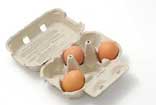Nutrition Makes a Difference

Optimal athletic performance requires food and nutrient intake that is tailored to each athlete’s sport, training schedule and individual needs. Many athletes, especially younger ones, gravitate toward typical eating patterns which can significantly decrease their chances to reach their peak performance. The basics of performance nutrition are discussed here to help maximize your physical potential and reach your performance goals.
Energy is the Foundation for Success
Your daily calorie intake should provide enough energy for all activities, muscle repair and optimal functioning. Energy needs for athletes vary considerably based on individual differences and activity level. General guidelines are listed below:
- Individuals who participate in general fitness (30 to 40 minutes of activity per day, 3 to 5 times per week) can meet their daily needs with 1,800 to 2,400 calories. This equates to approximately 11 to 16 calories per pound per day for people who weigh 110 to 175 lbs. Needs may be greater for those who weigh more.
- Athletes who train approximately 2 to 6 hours per day, 5 to 6 days a week need ~ 23 to 36 calories per pound of body weight per day. This equates to 2,500 to 8,000 daily calories for athletes who weigh up to 220 lbs.
- Elite athletes who train or compete heavily need significantly more – up to 12,000 calories per day.
- Athletes who weigh more than 220 lbs may need approximately 6,000 to 12,000 calories per day depending on training volume and intensity.
Monitoring your weight and body composition regularly will allow you to determine whether your daily calorie intake is appropriate. Because energy can neither be created nor destroyed, when you consume more energy (calories) than you use, no matter what kind of food it comes from, the excess is stored as body fat or used to build muscle. Similarly, if you burn more energy than you consume from food and beverages, your body mass decreases. Just as the high performance car uses a special blend of gasoline to achieve peak performance, athletes also require the proper mixture of fuel (carbohydrates, proteins, and fats) to perform optimally. Therefore, the “blend” of fuel and timing of meals and snacks are critical to optimizing your performance potential.
Carbohydrates – The Main Energy Source
Carbohydrates, which rapidly break down to blood sugar (glucose), are the body’s primary and favorite energy source. The brain, nervous system and muscles are fueled mostly by glucose. Therefore, a continuous supply of carbohydrates is necessary to prevent body stores from being depleted. Inadequate carbohydrate intake leads to low energy levels, fatigue and impaired performance. Proper management of the amounts, types and timing of this nutrient is required to fill and refill the main “gas tank”. Key carbohydrate guidelines are listed here:
- Carbohydrates should make up approximately 60 percent of your diet.
- Starches and grains (breads, pasta, rice, potatoes, etc) should be eaten at each major meal throughout the day to provide a lasting energy source. Major meals should be eaten three to four hours apart.
- Carbohydrates such as fruit, energy bars/shakes, and sports drinks are ideal for rapid fueling before activity and immediately after exercise to enhance recovery and muscle growth.
- Depending on the sport, you should consume 3 to 4.5 grams of carbohydrates per pound of body weight per day.
Protein – The Building Blocks

Muscles and other body tissues are made up of proteins. Although protein contains the same amount of energy as carbohydrates, its primary function is the growth and repair of these tissues. Because it is an inefficient source of energy, very little protein is used for fuel unless carbohydrate intake is limited or energy demands are extreme. In this case, protein is detoured from its main functions and is broken down for fuel. Eating adequate amounts of carbohydrates spares protein for building and repairing tissues and prevents the loss of lean tissue. General protein recommendations are listed below:
- Protein should make up approximately15 to 20 percent of total daily calories which most people meet with a typical diet.
- The daily protein requirement for sedentary adults is approximately 0.4 grams per pound of body weight per day but active adults require more - up to 1 gram per pound of body weight per day. ,
- Lean meats, poultry without the skin, fish, eggs and soy products are excellent sources of protein. Other sources include beans, nuts and low-fat dairy products.
Fats – The Body’s Unlimited Energy Source
Dietary fats are essential to health because they help deliver vitamins, minerals and nutrients needed for normal growth and functioning. However, most people get more than enough fat in their diet. Furthermore, fat is not the main energy source during exercise and the body’s stores cannot be depleted during exercise. This means daily fat intake is less important than carbohydrate and protein needs. In fact, what leads to fatigue – or what athletes refer to as “bonking” is caused by the depletion of carbohydrates. Guidelines for fat intake are listed below.
- Fat should make up approximately 25 percent of your diet
- The majority of fat intake will automatically come from protein foods such as meat, fish, milk and other dairy products.
- Good sources of healthy fats include olive oil, canola oil and nuts.
Summary
Based on the sport, the goal of performance nutrition is to eat carbohydrates, protein and fats in ideal amounts and at proper times to allow you to perform at a high level while preventing unwanted weight gain or weight loss. By keeping protein intake within the proper range to satisfy growth and repair, you can consume as much carbohydrate as necessary to keep filling the main “gas tank” and leave the remaining calories for dietary fats. For information, see "Proper Hydration", "Loading Your Energy Systems", and "Using Pre/Post Snacks to Maximize Training".
References
- Kreider RB, Almada AL, Jose Antonio J, Broeder C, Earnest C, Greenwood M, Incledon T, Kalman DS, Kleiner SM, Leutholtz B, Lowery LM, Mendel R, Stout JR, Willoughby DS, Ziegenfuss TN. ISSN Exercise & Sport Nutrition Review: Research & Recommendations J Int Soc Sports Nutr. 2004; 1(1): 1–44.
- McArdle WD, Katch FI, Katch, VL. Sports & Exercise Nutrition. Maryland: Lippincott Williams & Wilkins; 1999. p. 15.
- Burke LM, Kiens B, Ivy JL. Carbohydrates and fat for training and recovery. J Sports Sci. 2004 Jan;22(1):15-30. Review.
- Haff GG. "Carbohydrates." Essentials of Sports Nutrition and Supplements. Ed. Antonio J, et al. New Jersey: Human Press, 2007. 298.
- Maughan RJ, Burke LM. Sports nutrition. Malden, MA: Blackwell Science, 2002
- Unnithan VB, Goulopoulou S. Nutrition for the pediatric athlete. Curr Sports Med Rep. 2004 Aug;3(4):206-11.
- Ziegenfuss TN, Landis J. "Protein." Essentials of Sports Nutrition and Supplements. Ed. Antonio J, et al. New Jersey: Human Press, 2007. 256.
- Committee on Nutrition, American Academy of Pediatrics. Pediatric nutrition handbook, 3 ed. Elk Grove, IL: American Academy of Pediatrics, 1993